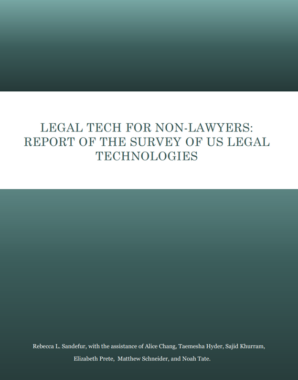Legal technology is a rapidly developing field. It includes tools targeted at a range of different user groups, including lawyers, law firms, corporations, in-house legal departments, court systems, community organizations, and individual users who are not
trained as attorneys. Some tools do legal work; others track and manage it. Still others are “under the hood,” allowing developers to more easily produce legal tools. With funding from the Open Society Foundations, the Survey of US Legal Technologies
sought to identify existing digital technologies that assist with justice problems in US jurisdictions and include among their user groups non-lawyers, whether individual members of the public working on their own justice problems or non-lawyers such as
social workers or community organizers working directly with the public. The main findings of the Survey are:
- Over 320 digital legal tools for nonlawyer users exist for US jurisdictions, offering assistance with a range of both criminal (e.g., arrest, police stops, expungement) and civil (e.g., family, housing, health, employment) justice problems.
- Just over half of tools (52%) assist the user in taking some action on a justice problem, such as producing a legal document, compiling evidence, diagnosing a legal problem, or resolving a dispute.
- Using many tools requires resources or capabilities that some groups and communities are unlikely to have. The same groups often unable to access traditional lawyer assistance – such as people with low incomes, racial minorities, and people with lower levels of education – are also less likely to be able to use digital tools.
- Many tools reflect outdated design standards, presenting long lists, long articles, and lots of text.
- Tools are both restricted and limited in the services they provide. Few offer more than one function. A large component are simply repositories of information about the law. Few tools aid users in diagnosing legal aspects of problems they experience.
- The types of justice problems served by the tools, while often important, only partly match the types of justice problems most commonly reported by Americans.
- Many tools are free to use, but a substantial minority charge the user.

